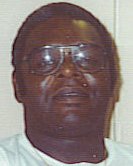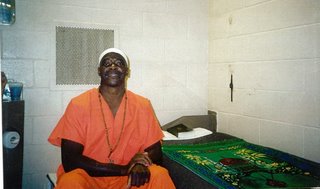Clarence Hill
Clarence Hill is on Florida death row - Clarence was killed by Jeb Bush September 20, 2006
Thursday, September 21, 2006
With Love From Johnny Robinson
I refuse to become the monster they wish to portray me as and that´s a victory in itself."~~ November 17, 2001 ~~
Johnny´s thought about the Death Row, written Oct 16, 2002
after the execution of Rigoberto Sanchez:
"This place tends to depress people to the point where they would rather be dead than continue attempting to exist under these conditions.
Couple that with the constant threat of death and the absolute certainty one has no other future to look forward to – getting it over with begins to look for better.
It´s bad when you´re taken away a man´s liberty and his dignity but this place can even take away one´s humanity and all senblance of hope.
It´s at that point one questions the sense in continuing the struggle".
In memory of Amos and Clarence
Wednesday, September 20, 2006
Court refuses to delay Hill execution - SCOTUS BLOG
Wednesday, September 20, 2006
Court refuses to delay Hill execution - SCOTUS BLOG
http://www.scotusblog.com/movabletype/
03:24 PM Lyle Denniston Comments (0)
Dividing 5-4, the Supreme Court on Wednesday refused to delay the execution in Florida of Clarence E. Hill, thus clearing the way for the state to carry out the sentence around 6 p.m. this evening. The Court issued no opinion. The brief order noted that Justices Stephen G. Breyer, Ruth Bader Ginsburg, David H. Souter and John Paul Stevens would have granted a stay.
The Court acted on Hill's stay application alone (06-A-301), and thus took no action on his pending cert petition, Hill v. McDonough (06-6545). If the execution goes forward under a death warrant signed by Florida Gov. Jeb Bush, that will moot Hill's appeal since that seeks an opportunity to challenge the method of lethal injection.
By denying the stay request, the Court leaves Hill without a remedy that the Court last June had ruled he could pursue: a civil rights challenge to the lethal injection protocol used in Florida. At the time the Court issued that ruling, it was aware that he had filed his delay request shortly before an execution was scheduled -- the very issue that has now led the Eleventh Circuit Court to refuse to delay the execution further, after concluding that defense lawyers had engaged in delaying tactics.
Without an opinion from the Court, however, it is unclear whether the Court majority actually agreed with the Eleventh Circuit on its rationale. The practical result, though, was that the Eleventh Circuit denial of a stay stands, and the execution may now proceed.
It would have taken the votes of five Justices to grant a stay. An earlier post on HIll's plea to the Court can be found here, containing links to the application and the petition for review.
More on Hill
http://capitaldefenseweekly.com/
From Attorney Karl Keys BLOG :
Tuesday, September 19, 2006
More on Hill
Courtesy of the SCOTUSBlog, find the Clarence Hill stay application here. The petition for certiorari can be found here. The second question in the petition is pretty dead on and the petition does a fair job laying out the current state of the law. From that petition:
Yet despite the recognition by numerous states and circuits that lethal injection procedures merit review, executions have proceeded in other states - - states which have lethal injection protocols substantially similar, if not exactly the same, as states which have halted their executions. Texas, for example, has executed 21 people this year by lethal injection, fully half of all the executions in the country for 2006. www.deathpenaltyinfo.org (site last visited September 17, 2006). As one judge in a Tennessee capital case cogently observed regarding the wide disparity and arbitrary nature of court responses to lethal injection challenges and theirarbitrariness:
[T]he dysfunctional patchwork of stays and execution going on in this country further undermines the variousstates’ effectiveness and ability to properly carry out death sentences. We are currently operating under a system wherein condemned inmates are bringing near identical challenges to the lethal injection procedure. In some instances stays are granted, while in others they are not and the defendants are executed, with no principled distinction to justify such a result.Alley v. Little, No. 06-5650 (6th Cir. May 16, 2006)(Martin, J., dissenting from denial of a rehearing en banc)(emphasis added).A review of lethal injection litigation around the country demonstrates that courts have developed essentially two methods to handle lethal injection claims. One approach, utilized by the Fourth, Fifth, and (now) Eleventh Circuits, is to deny both the claim and the stay based upon dilatoriness, without any examination of the merits in assessing the equities involved. (See, e.g., White v. Johnson, 429 F.3d 572, 573-74 (5th Cir. 2005); Harris v. Johnson, 376 F.3d 414, 417-18 (5th Cir. 2004), and Hill v. McDonough, Case No. 06-14927 (2006)). The second method, which has been used in the Eighth, Ninth, and Tenth Circuits, is that a stay is denied, but the case is not dismissed.
Rather, the case is permitted to proceed on a fasttrack basis, and if the plaintiff develops enough evidence, a stay is then granted. Patton v. Jones, 2006 U.S. Dist. LEXIS 54429 (Okla. W.D. Aug. 4, 2006) affirmed, stay denied, Patton v. Jones, 2006 U.S. App. LEXIS 22312 (10th Cir. Aug. 25, 2006), Patton v. Jones, petition denied, stay denied, 2006 U.S. LEXIS 5379 (Aug.29, 2006); Morales v. Hickman, 2006 WL 335427 (N.D. Cal., Feb. 14, 2006) reviewed at Morales v. Hickman, 2006 WL 391604 (9th Cir., 2006); Taylor v. Crawford, 445 F.3d 1095, 1097- 98 (8th Cir. 2006) on remand, Taylor v. Crawford, 2006 U.S. Dist. LEXIS 42949, 22 (June 26, 2006). Thus, in Patton, Morales, and Taylor, a determination on the merits was made in a very limited amount of time, and enough discovery and testimony were adduced to allow meaningful consideration to be given to the plaintiffs’ claims. Clearly, these cases demonstrate that it is possible to litigate and resolve lethal injection issues quickly.
permalink comments links to this post
Quick roundup from
Quick look around the web, the various courthouses and media outlets:
SCOTUSBlog looks at Clarence Hills chances of cert a second time. The question presented in Hill's case will eventually be granted cert, the question is if not now, when, as their appears to be a fairly wide split among the lower courts on the questions presented although Courts on all sides of the question have been fairly discrete about not citing the splits.
Will Florida execute Clarence Hill today?
http://sentencing.typepad.com/sentencing_law_and_policy/death_penalty_reforms/index.html
From the BLOG Sentencing, Law and Policy :
September 20, 2006
Will Florida execute Clarence Hill today?
Almost exactly nine months ago, at roughly 6pm on January 24, 2006, Clarence Hill was strapped to a gurney and IV lines were run into his arms as Florida's execution team awaited the expected denial of Hill's final appeal to the Supreme Court. After about an hour in which Hill lay on the gurney anticipating his execution, Justice Anthony Kennedy issued a stay to allow the Supreme Court more time to consider whether Hill could attack Florida's lethal injection protocol through a 1983 action.
Though Hill prevailed in the Supreme Court, as detailed in this newspaper article, Florida is poised in less than twelve hours to try again to kill Clarence Hill again. And the merits of his 1983 action have still never been considered. Capital Defense Weekly has more on Hill's final(?) appeal to the Supreme Court, and Human Rights Watch has this interesting open letter to Florida Governor Jeb Bush urging him to postpone Hill's execution.
As I have documented via many blog posts and this recent article, much has transpired in the death penalty world over the last nine months. However, for Clarence Hill, it appears that the story will have a particular Shakespearian quality: Hill's litigation tale seems likely to end up as one "full of sound and fury; signifying nothing."
Speaking of "sound and fury; signifying nothing," this newspaper article also spotlights Florida Governor Jeb Bush's unsurprising reaction to the massive ABA report criticizing Florida's death penalty (details here):
''I believe that the death penalty process here is protected, correctly so, by an appeals process that is extensive,'' Bush said, adding that if anything, it is unfair to crime victims and their families. ''It can go on for more than 10 years. For a lot of people, that is denial of justice,'' Bush said.
Some recent related posts:
Up and down the Hill again
Will Clarence Hill get another SCOTUS ex machina?
My lethal injection piece on SSRN
ABA produces mega-report assailing Florida's death penalty






